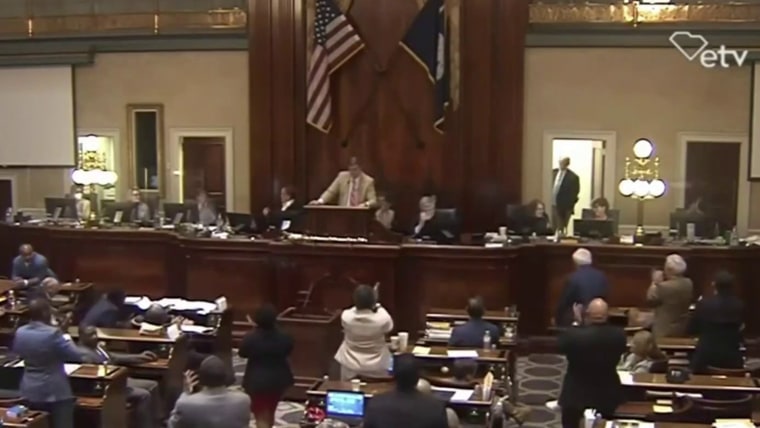Just months after the exit of its sole female justice, the South Carolina Supreme Court on Wednesday upheld restrictions that would ban most abortions after around six weeks of pregnancy.
The 4-1 decision means the state’s abortion ban, which Republican Gov. Henry McMaster signed into law in May, can go into effect.
The decision brings an end to the brief relief abortion rights advocates found in January when then-Justice Kaye Hearn wrote a majority opinion striking down a separate six-week ban tied to a 2021 state law, arguing it violated the state’s constitutional right to privacy. After Hearn’s mandatory retirement, South Carolina was left with an all-male high court.
In the majority opinion Wednesday, Justice John Kittredge wrote that “to be sure, the 2023 Act infringes on a woman’s right of privacy and bodily autonomy,” while holding the law was still constitutional.
“The legislature has made a policy determination that, at a certain point in the pregnancy, a woman’s interest in autonomy and privacy does not outweigh the interest of the unborn child to live,” he wrote. “As a Court, unless we can say that the balance struck by the legislature was unreasonable as a matter of law, we must uphold the Act.”
Before she left, Hearn declined to comment on the January opinion she authored. She responded to Wednesday’s decision, writing in a text message, “It is a very sad day for our state.”
Before Wednesday’s decision, abortions were permitted in South Carolina up to 22 weeks of pregnancy. The bill that was signed into law this year prohibits most abortions after fetal cardiac activity is detected.
The ban has exceptions if a patient’s life is in danger, and the procedure is allowed for fatal fetal anomalies. The law also includes an exception of up to 12 weeks for rape or incest.

South Carolina Senate votes to pass 6-week abortion ban
Abortion access has plummeted in the South in the year since the U.S. Supreme Court overturned Roe v. Wade.
And South Carolina is in a region with some of the most restrictive abortion bans in the country. Abortion-rights advocates said the ruling means patients seeking abortions will have to travel farther.
Planned Parenthood South Atlantic CEO Jenny Black said in a statement that the group will continue to provide abortions in South Carolina “under the severe restrictions of the law, but we know it’s not enough.”
Holly Gatling, the executive director of South Carolina Citizens for Life, said before Wednesday’s ruling that the state had not fully felt the impact of the U.S. Supreme Court’s Dobbs decision in June 2022, which rolled back federally protected abortion rights.
“We are moving forward in restoring legal protection to the unborn members of our human family,” she said.
Gatling said she expected the number of pregnant people traveling to South Carolina for abortions would decrease in the wake of Wednesday’s decision.
“South Carolina was until today an abortion destination state in the Southeast,” she said.
Proponents of access to abortion care have condemned the top court’s about-face.
Advocates argue that the 2023 law at the center of Wednesday’s ruling was not substantially different from the precursor the court found unconstitutional.
“This abortion ban is nearly identical to the ban struck down by this court just months ago—the only thing that has changed is the makeup of the court,” Black said in a statement.
Hearn’s successor, Justice Gary Hill, a former state appeals judge, voted with the majority.
Chief Justice Donald W. Beatty wrote in his dissent that the new law “suffers from the same infirmities that rendered the 2021 Act unconstitutional.”
He condemned the reversal, writing that the court, “despite its insistence otherwise, has turned a blind eye to the obvious fact that the 2021 Act and the 2023 Act are the same (italics in original). The result will essentially force an untold number of affected women to give birth without their consent. I am hard-pressed to think of a greater governmental intrusion by a political body.”
More battles over abortion restrictions in South Carolina may be ahead.
In a statement lauding the decision, the South Carolina Senate Republican Caucus, which holds a majority, said “our fight is not over.”




